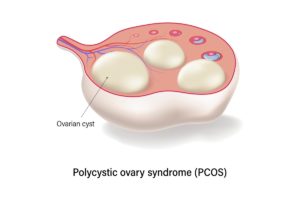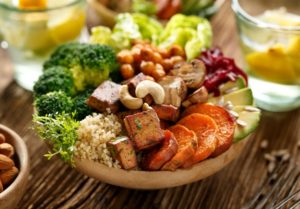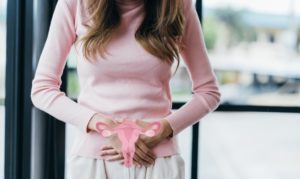You have a diagnosis of PCOS and are wondering: what now?
If this news came to you recently, you must feel very confused.
I completely understand; when you search for information about female hormones, you are met with lots of conflicting answers.
It also seems that no one around you really understands everything behind this syndrome.
First of all: It’s not easy to deal with being and feeling overweight when the only reason was that you were overeating.
Now add a hormonal problem!
Did you know that…
Even the representatives of the European Society of Human Reproduction and American Society of Reproductive Medicine modified the concept of PCOS by defining it as a disorder with multiple phenotypes.(1)
This means that the syndrome can present in multiple ways in each woman.
If you consider that 1 in 10 women can have PCOS in the UK(2), can you imagine how many variations there can be?
Some women may even have PCOS without knowing it!
This represents a major challenge for any professional who has to find a suitable solution.
You don’t know how to deal with all the PCOS symptoms and need an immediate lifestyle change to feel better?
I am pleased to tell you that you are in the right place to clarify your doubts and use a very effective laser sharp customised definitive solution for your PCOS symptoms.
What are the Symptoms of PCOS?
PCOS (polycystic ovary syndrome) symptoms are very varied. (2)
You can be in a room with 10 other women suffering from PCOS and you will notice that they will all have a different combination of symptoms.
This syndrome may include 2 or more of the following manifestations:
 Irregular or missed menstrual periods
Irregular or missed menstrual periods- Multiple painless ovarian cysts confirmed by pelvic ultrasound
- Infertility
- Weight gain (especially around the waist)
- Acne
- Excess hair growth on face and body
- Hair loss
- Severe hair thinning
In addition, other unusual symptoms may also occur, such as:
- High blood pressure
- Insomnia
- Sleep apnoea
- Mood changes
- Depression
- Anxiety
This means that women with PCOS need to be listened to and cared for,
But above all, a woman with PCOS needs specialised care.
In recent years, several studies have shown an increasingly strong association between PCOS and mental health. (3)
This makes it a really serious problem, as it not only affects the reproductive system.
PCOS affects your mood and is also a major metabolic problem that affects several Body systems.
Dealing with heavy or prolonged periods causes lots of anxiety.
And not knowing whether infertility could be permanent is a constant concern among women.
Having to go through menstruation every month is upsetting enough!
I can’t imagine what it’s like to have to endure the symptoms of PCOS caused by multifactorial hormonal imbalances!
Your head fills with negative thoughts, and you think that:
– If you are overweight, it becomes more challenging to reduce measurements without the right help and,
– You start to become overly conscious of your physical appearance due to acne, oily skin, coarse facial hair, uncontrollable cravings for sweet food and so on!
On top of that, due to irregular menstrual cycles and lack of ovulation, the uterus wall may not shed as often as it should.
This means that without PCOS management, the risk of cancer of the lining of the uterus (endometrium) may increase.
The priority for you should be to get a PCOS rehabilitation program for the busy woman in London that will bring your health to an optimal level.
A laser sharp customised PCOS rehabilitation program is designed to address all aspects of a woman’s health.
Not just aimed at relieving symptoms, PCOS rehab aims to help women build a new, active and healthy lifestyle.
This is achieved by addressing each individual’s needs, from the PCOS diet, to a highly scientific customised exercise programme to improve the symptoms of PCOS.
Understanding the Causes and Risks
Although you may be interested in finding out more about PCOS just to improve specific symptoms or to find out how you can lose weight with PCOS, comprehensive consultation in London offers much more than that.
PCOS (polycystic ovary syndrome) is a complex disorder and requires a thorough analysis of the case through a detailed consultation.
When you want to effectively address your PCOS symptoms, one rule fits all generalisation or using a superficial approach will never work. The first thing to know about PCOS is that the exact cause is unknown, in fact, it is likely that there is a combination of factors of PCOS that trigger the hormonal imbalance. (4) Elevated androgens are the main cause of the “masculinising” features of the syndrome (coarse facial hair in the chin area and fat distribution predominantly in the abdominal area). Research shows that PCOS also appears to have a profound hereditary origin. (2) Therefore, daughters whose mothers have PCOS are at increased risk of having the syndrome. So far 4 types of PCOS have been described: I would like you to read my article on the types of PCOS so that you can get a more detailed idea of the causes of PCOS. Through a professional and comprehensive consultation completed before creating the PCOS rehabilitation program, it will be possible to clearly define which type you belong to. You can have a free consultation now; Book here! This is important as it allows you to individualise the programme taking into account many personal aspects such as: In addition, as the goal is your health, it must be determined what risks you have based on your background and current lifestyle. PCOS is not just about periods that stop and start constantly. Without proper monitoring and management, this syndrome can increase your risk for PCOS: After 25 years of follow-up, an observational study found that 26% of women with PCOS in the UK develop type 2 diabetes, (5) In addition, they may have a low level of good cholesterol (HDL), a high level of bad cholesterol (LDL) and excess triglycerides. Did you know that these factors can increase your risk of having a heart attack or stroke in the future? A laser sharp customised, radical but super sustainable lifestyle change is essential to help you stop all the risks of PCOS. In PCOS there is an excess production of androgens (male hormones) which may be of ovarian or adrenal origin.
In PCOS there is an excess production of androgens (male hormones) which may be of ovarian or adrenal origin.
The disorders associated with Polycystic Ovary Syndrome are very serious
The PCOS diet: How to Manage Symptoms through Nutrition and Healthy Eating
Have you ever heard the phrase: all roads lead to Rome?
Do you find that when it comes to finding a solution for your PCOS, all roads lead to dieting?
Maybe nutrition doesn’t seem so relevant to you right now.
I’m sure you know that with a proper diet you can lose weight, but do you know HOW MUCH you can achieve with a diet specifically geared towards resolving the PCOS symptoms?
PCOS diet is the main way to go and there are very good reasons behind this. The personalised approach of a highly nutritious, science-based diet allows you to lose weight but also: • Helps lower the androgens that cause your symptoms But, a balanced diet does not mean eating a little of everything and hoping for the best. Dieting without supervision is like leaving your health to chance. There is a specific diet for you and the mission of comprehensive consultation is to find out what it is. Depending on your type of PCOS and the associated disorders you have, different nutritional approaches can be created, For example, some types of diet that you could implement with the proper supervision of a professional PCOS team in London are: The precise concept of the glycemic index indicates that it is the measure of how fast a food can raise your blood sugar (glucose) level. (6) The body digests foods with a low glycemic index more slowly, which means that this type of diet at least to some extent allows you to control glucose levels and improve insulin resistance. Insulin resistance can be a cause of PCOS, but it can also be part of the symptoms of PCOS. That is why it is essential to start with a customised dietary management PCOS nutrition programme right from the beginning. Foods with a low glycemic index include whole grains, legumes, nuts, seeds, fruits, starchy vegetables and other unprocessed foods. Anti-inflammatory foods, such as fruits, green leafy vegetables and extra virgin olive oil, can reduce symptoms related to inflammation. (7) In this type of diet it is important to define if you have any gastrointestinal problems like IBS or IBD etc, in order to avoid those foods that can make you feel discomfort. An important point of the PCOS diet is that it should make you feel good, but it should also make you feel happy. By eliminating inflammation, which is one of the causes of PCOS, your symptoms will begin to improve noticeably. Your gut will start to function properly and that will be conducive to improving your mood. Did you know that the brain and the gut are closely related and therefore the health of one has an impact on the other? (8) Research shows that a sick gut can disrupt the synthesis of serotonin since 95% of it is produced right there! (9) Did you know this? A dedicated PCOS and mental health nutritionist will always put gastrointestinal health first because that is where the key to happiness lies. The focus of this type of diet is to steer you away from the risk of heart-related disease, as women with PCOS are at increased risk of cardiovascular disease. (10) When you limit foods high in saturated fats such as animal meats and processed products high in sugar: (11) • Improve your cholesterol level As a general measure, I could advise you to avoid harmful treats and snacks and eat healthy foods. But, is that enough information for you to get the results you want? Of course, it is not. You need a thorough understanding of your particular case as you may need a combination of some of these diets. Just like Jessica, before we met she tried everything on her own without making any progress. Jessica says: “As part of the medically supervised exercise and nutrition plan I was provided with a compressive range of recipes and expert dietary advice to understand where I was going wrong. Having the right dietary solution allowed her to get active again and get her period back. One of the super positive changes that nutrition customization will create is that it will be very easy for you this time to follow a PCOS nutrition programme properly. This is because the delicious meals will be created up solely and exclusively of a very large variety of foods that you will get to like! Your medically supervised programme will guide you all the way and it will focus on the specific foods you need to meet your nutritional and metabolic needs. Through your laser sharp and super varied customised nutrition, it is possible to manage the hormonal imbalance that causes increased androgens and therefore control your symptoms. (12) If you are overweight, you should work on reducing body fat, this is important because adipose tissue is considered an endocrine organ! Did you know that? (13) This means that the fat stored in your adipose tissue produces hormones, and these hormones can worsen the hormonal imbalance of PCOS the higher your body fat percentage. Lifestyle changes that include a PCOS rehabilitation program can modify the course of PCOS and decrease the risks of this syndrome. (1)
• Improves mood
• Restores ovulation
• Improves overall fitness
• Improves insulin sensitivity
• Heals the gut through an anti-inflammatory diet
• Supports detoxification, which is achieved by limiting processed foods
• Ensures optimal nutrition in order to achieve a pregnancy Eating a balanced diet that meets nutritional needs, maintains a healthy weight and promotes good insulin levels can help women with PCOS feel better.
Eating a balanced diet that meets nutritional needs, maintains a healthy weight and promotes good insulin levels can help women with PCOS feel better. Low glycemic index diet

Anti-inflammatory diet

Cardioprotective Diet
• Lower your triglyceride levels
• Improve PCOS symptoms
• Improve your digestive system (processed foods are extremely damaging to your intestinal flora)
• Lowers your body weight
• Decrease chronic pain
When it comes to PCOS, I don’t like to overlook any details, as dietary customisation is one of the cornerstones of successful results. i.e., Rather than feel constrained, the large number of delicious recipes made me feel that I had plenty of yummy foods to eat. Jazz provided plenty of practical steps for me to follow. Also, it became evident that I needed to take supplements and sort out a thyroid issue that medical professionals had missed.”
i.e., Rather than feel constrained, the large number of delicious recipes made me feel that I had plenty of yummy foods to eat. Jazz provided plenty of practical steps for me to follow. Also, it became evident that I needed to take supplements and sort out a thyroid issue that medical professionals had missed.” You can achieve this by selecting the right nutrients in your daily diet and taking natural supplementation as needed.
You can achieve this by selecting the right nutrients in your daily diet and taking natural supplementation as needed.
The Benefits of Exercise For PCOS and Recommended Types of Exercise
This is one of my favourite part, and I’m not planning to discredit the diet.
But, do you know how good it feels to finish a workout?
Movement oxygenates your whole body and gets your heart racing, that’s why exercise is synonymous with life!
As an elite London personal trainer, I love to safely (SAFE is a keyword) help my clients achieve their maximum fitness level, respecting their pace and physical capacity.
Exercise for PCOS is very special because it has a huge scientific foundation to back it up and when is used correctly makes it a powerful tool to improve symptoms in women with PCOS.
But it is also special because exercise restores self-esteem to women who have lost the ability to love themselves due to the anxiety generated by the symptoms of polycystic ovary syndrome. I don’t want to highlight the things that make you feel bad. I just want to tell you about the solution to this problem. Yes, as long as you follow a personalised programme guided by this team of highly trained professionals: PCOS DOES HAVE A SOLUTION. No matter how long you have been out of exercise or if you have injuries that prevent you from performing certain movements, together we can create an exercise plan to suit your requirements. I teach my clients to use their full capacity to achieve their transformation. We do this step by step, using highly effective techniques to increase your strength, stamina, resilience to exercise, agility, flexibility and endurance. I had one client who wanted to feel more active so that she could do outdoor physical activity with her husband without ending up exhausted or quitting in the middle. Jessica was very motivated, but at first the symptoms of PCOS bothered her. After finding the right exercises for her, her transformation began in impressive fashion. The next day I never felt too much muscle pain, meaning that I was pushing myself without risk of injury. I used to experience back pain including some sciatic pain. I am not experiencing back pain in the same way.” Are you ready to experience wellness at its best? Read about how exercise can benefit you here: Brisk walking, gentle jogging, stationary jogging and cycling are some of the cardio exercises widely used to improve cardiovascular health. Through this type of aerobic exercise, oxygenation of the body’s systems is improved by increasing blood circulation. This means that cardio exercise is a refreshing oxygen bath that wakes up your organs, including your ovaries! Studies show that after 16 weeks of laser sharp customised training, significant changes in the reproductive system related to PCOS symptoms have been observed: (14) These changes occurred even in women who did not change their body weight. (14) Do you know why this is a very important fact? Because it means that with a customised exercise programme on your side you win a good part of the battle! That’s why my PCOS rehabilitation program includes customised exercise and bespoke diet as two tools that when combined become a powerful solution for all women suffering from PCOS. – Would you like a free consultation to define every aspect of your case? Schedule it here. Research shows that by practising physical exercise such as Pilates, the insulin receptors in the muscles are activated and the excess insulin in the blood is captured, thus achieving normal levels. (15) In other words, your ovaries won’t pick up insulin and your symptoms will improve! This includes acne, hair loss and coarse hair on your face! On the other hand, regular physical activity decreases inflammation levels and helps to control stress. Of course, This is all in general terms. This is why you need a more specific approach, not just because you have PCOS, but because you are unique. If I’m training two women with PCOS and they both complain of back pain, knee pain, shoulder, joint pain or neck pain during exercise, it’s important to know the cause. That’s why I’m very insistent about the initial comprehensive consultation, so that I can gather all the details of your history and injuries. This is crucial. During training I focus 100% on improving your physical ability, and not being aware of your injuries beforehand could cause you harm. As a hypothetical case, the first woman might have back pain or neck pain caused by a cervical or lumbar herniated disc. In this case, exercises that require neck mobilisation cannot be performed and she should probably be receiving physical therapy at the same time. But, the second woman presents with a cervical pain of short evolution that has a muscular origin specifically in the area of the trapezius muscle. This area tends to contract due to: In this case it can be improved with customised Pilates exercises, or selected stretching and gentle bespoke movement to relieve the muscle contracture. In addition, avoiding the postures that caused the pain is the key to preventing the pain from returning. In both cases with the same pain, the solution is totally different. The customised Pilates PCOS weight loss journey is wonderful because they are low impact exercises that strengthen every muscle in the body with minimal risk of injury. Change your future through exercise • Do you constantly wonder if you will be able to fulfil your dream of becoming a mother? • Do you think that having PCOS seems like an elusive dream? • Have you been trying for a long time to get pregnant but your menstrual cycle disorders have prevented you from doing so? All that worry can be put behind you. Certainly women with PCOS in London may benefit from seeking out a fertility specialist as they may sometimes require medication to promote ovulation. But, physical exercise does a lot to improve reproductive health. Restoring your menstrual cycle is the first step towards your longed-for pregnancy. Regular customised exercise is part of the main prescription for managing PCOS and its symptoms. (16) And although there is a general recommendation that suggests at least 150 minutes per week, (17) only you know how much exercise you can manage according to your health history, fitness level, schedule and physical capacity. At least at the beginning of the PCOS rehabilitation program, you will be able to do the exercise you can handle, without pressure. Once you start to see results and your endurance increases thanks to evidence-based PCOS training, you won’t want to stop! You’ll have so much energy you won’t believe it. As you exercise for PCOS to get pregnant, you will experience the benefits of physical activity: All these benefits are achieved by taking into account that there are 4 types of PCOS described so far and, therefore, your recovery plan must be individualised according to each one. For example, you may be a woman with PCOS and want to get pregnant. In a study in 2023 in women with PCOS in the UK it showed that reducing body weight improves the hormonal environment and therefore pregnancy is more likely to occur. (18) But what if you are a woman with PCOS who is not overweight? In that case, the plan is not created with weight loss in mind, but rather to address the specific cause of your PCOS, which could be insulin resistance or adrenal PCOS. For cases of adrenal PCOS, one of the best exercises is yoga. Thanks to the low-impact type of training it helps to lower cortisol levels (stress hormone produced by the adrenal glands). So, decreasing stress through a yoga session is highly beneficial for women with adrenal PCOS. But that’s not all, yoga for PCOS weight loss is also possible. Did you know that according to Harvard Medical School a 185-pound person can burn 168 calories in just half an hour of yoga? (19) As an elite personal trainer in London who has worked with all types of athletes and women and men with injuries, I can tell you that the best exercise for PCOS sufferers is the one you can enjoy! Simply, There is no generalised training formula. One of the positive changes that exercise customisation will create is that which is going to both very effective and you will be able to stick to the new routine very easily. No more giving up generalised exercise routines that just leave you exhausted and don’t deliver results and makes you upset and angry. A customised routine is adapted to your physical condition and through supervised stretching and flexibility exercises you will be able to build up the elasticity of your muscles and thus: You will receive just the right amount of push to help you achieve your transformation one step at a time.
Improve your ovarian health with cardiovascular exercise
Pilates exercises for the rehabilitation of women with PCOS
 And when I say A LOT, I mean you can smartly exercise for PCOS to get period back.
And when I say A LOT, I mean you can smartly exercise for PCOS to get period back.
The Role of a Qualified Personal Trainer and Supervising Exercise Programs for PCOS
The most effective way to:
- Improve your body composition,
- Reduce weight,
- Improve your mood and,
- Restore your menstrual cycle is to have a structured exercise plan guided 1-2-1 by a professional.
Even if you have back, knee, ankle, shoulder injuries or chronic pain, your workout program is planned safely so that you can perform every movement without any risk.
That’s why I limit myself to working only with women who are committed to their health and are willing to improve in all aspects of their lives.
I will not take the risk of giving generalised advice, as this not only takes you away from your goal, it can also do you more harm.
The PCOS management program includes supervision by a team of highly trained medical professionals in nutrition and coaching for women with polycystic ovary syndrome.
The rules are smartly structured and individualised for women in London who are committed to their well-being.
The first thing I want to address is your current diet, as according to the latest research on PCOS treatment, diet is the cornerstone of improving PCOS symptoms.
And while there are specific recommendations, such as fibre intake to improve insulin resistance (if any), they cannot be recommended from the outset without assessment.
For example, green smoothies loaded with selected vegetables are an excellent source of fibre, vitamins, antioxidants and enzymes.
When used correctly and in the proper context, this could be a potent elixir for reproductive health and nervous system health. (20)
But imagine two women, both obese but one of whom suffers from irritable bowel disease.
The second woman suffers from constipation.
In the first case, an ideal approach would be to start a low-fibre diet for a couple of weeks to help deflate the colon.
During the follow-up of this case and under medical supervision, the most appropriate continuation will be considered to avoid discomfort.
In the second case, a woman with constipation may benefit greatly from the inclusion of customised green smoothies as they provide the correct nutrients, energy balance, fibre + water.
This is the key combination to improve bowel movement.
Both women will have a different approach through a PCOS diet programme that will allow them to progress at their own pace, taking into account their individual needs.
Physical condition is also assessed.
And, chances are, you might not be too keen on the idea of exercise.
But, I can tell you with confidence that you’ll end up loving the PCOS exercise program because it’s formulated based on scientific evidence, combined with my experience working with several elite athletes and in the way I will organise this for you – soon will make you start feeling awesome.
That means:
I will create the best supervised routine that fits you like a glove.
Have you ever felt that post-exercise pain?
The one that tells you that you have worked your muscles.
That is the purpose: to stimulate your muscle fibres enough to promote the creation of muscle mass, which generates the correct muscle tension due to the effort made in the area.
You will in no way feel pain or risk injury, thanks to the 1-2-1 guidance of a qualified personal trainer in London who will monitor the correct execution of each exercise.
Jessica is one of my clients and she managed to improve her lower back pain after a few weeks of exercise.
Here’s what she says after completing her PCOS exercise program:
“I used to experience back pain including some sciatic pain.
I am not experiencing back pain in the same way.
There is a huge improvement in my back health compared with before starting to train with Jazz.”
• Have you ever experienced back pain when performing some exercises?
• Does back pain prevent you from doing some daily tasks?
• Are you afraid to make sudden movements because of back pain?
These and other questions should be answered at the comprehensive consultation as back pain can have multiple causes.
It is essential to review your history in order to choose a specific routine.
For example,
One cause could be spinal spondylosis, which is managed with flexibility exercises in the hamstrings and lumbar paravertebral muscles.
This condition has a degenerative cause, so it is not reversible, but the pain can improve significantly using correct exercise customisation and healthy weight loss. (21)
Another common cause of low back pain is spasm or strain of the muscles in that area.
Did you know that carrying a lot of weight with improper posture can affect the muscles in your lower Back?
The approach requires postural education in daily chores to alleviate the painful contraction and can be 100% reversed. (22)
The essential thing, in this case, is to focus on core strengthening to protect your spine and give you better balance.
These are the benefits of a fully customised workout: No detail is left out.
You can schedule a free consultation today to start your transformation!
This is for women with PCOS who are available for personal outdoor coaching near home and those who prefer to do the training via video.
Either way, you will receive the supervision you need to achieve the change you desire and dramatically improve your reproductive health.
Who is Jazz Alessi
Jazz Alessi is an elite personal trainer, injury rehabilitation specialist and a Harley Street nutritionist specialising in women with PCOS in London with 20 years experience.
He also has extensive experience in knee and back injury rehabilitation and training with high performance athletes.
This allows him to create the best PCOS rehabilation programs for women that include specific nutrition to improve the hormonal system, delivery advice coaching and exercises to help improve insulin resistance and reduce body weight – all medically supervised.
Women in London with PCOS benefit greatly from an elite personal trainer who offers a highly detailed customised programme focused on achieving each woman’s specific goals.
Keen to get started?
For a limited time only, access Jazz through a FREE CONSULTATION !
References
1. Szczuko M, Kikut J, Szczuko U, et al. Nutrition Strategy and Life Style in Polycystic Ovary Syndrome-Narrative Review. Nutrients. 2021;13(7):2452. Published 2021 Jul 18. doi:10.3390/nu13072452 https://www.ncbi.nlm.nih.gov/pmc/articles/PMC8308732/
2. Overview – Polycystic ovary syndrome. NHS UK https://www.nhs.uk/conditions/polycystic-ovary-syndrome-pcos/#:~:text=Polycystic%20ovaries,-Polycystic%20ovaries%20contain&text=It’s%20difficult%20to%20know%20exactly,do%20not%20have%20any%20symptoms.
3. Hung JH, Hu LY, Tsai SJ, et al. Risk of psychiatric disorders following polycystic ovary syndrome: a nationwide population-based cohort study. PLoS One. 2014;9(5):e97041. Published 2014 May 9. doi:10.1371/journal.pone.0097041 https://www.ncbi.nlm.nih.gov/pmc/articles/PMC4016227/
4. Polycystic Ovary Syndrome (PCOS) Last reviewed by a Cleveland Clinic medical professional on 09/21/2021 https://my.clevelandclinic.org/health/diseases/8316-polycystic-ovary-syndrome-pcos#:~:text=Several%20other%20factors%20also%20play,to%20develop%20in%20the%20ovaries.
5. Incidence and prevalence of diabetes and cost of illness analysis of polycystic ovary syndrome: a Bayesian modelling study Tao Ding, Paul J Hardiman, Irene Petersen, Gianluca Baio. Human Reproduction, Volume 33, Issue 7, July 2018, Pages 1299–1306, https://doi.org/10.1093/humrep/dey093 https://academic.oup.com/humrep/article/33/7/1299/4976976
6. What is the glycaemic index (GI)? NHS UK https://www.nhs.uk/common-health-questions/food-and-diet/what-is-the-glycaemic-index-gi/
7. Anti-inflammatory effects of plant-based foods and of their constituents. Bernhard Watzl. Int J Vitam Nutr Res. 2008 Dec;78(6):293-8. doi: 10.1024/0300-9831.78.6.293. https://pubmed.ncbi.nlm.nih.gov/19685439/
8. The Gut-Brain Axis: How Microbiota and Host Inflammasome Influence Brain Physiology and Pathology. Andrina Rutsch , Johan B Kantsjö , Francesca Ronchi. Front Immunol. 2020 Dec 10;11:604179. doi:10.3389/fimmu.2020.604179. eCollection 2020. https://pubmed.ncbi.nlm.nih.gov/33362788/
9. Serotonergic Mechanisms Regulating the GI Tract: Experimental Evidence and Therapeutic Relevance. Natalie Terry and Kara Gross Margolis. Handb Exp Pharmacol. Author manuscript; available in PMC 2017 Jul 25. Published in final edited form as: Handb Exp Pharmacol. 2017; 239: 319–342. https://www.ncbi.nlm.nih.gov/pmc/articles/PMC5526216/#:~:text=95%25%20of%20the%20body’s%20serotonin,%2C%20paracrine%2C%20and%20endocrine%20actions.
10. Front. Cardiovasc. Med., 12 November 2020 Sec. Cardiovascular Epidemiology and Prevention Volume 7 – 2020 | https://doi.org/10.3389/fcvm.2020.552421 Risk of Cardiovascular and Cerebrovascular Events in Polycystic Ovarian Syndrome Women: A Meta-Analysis of Cohort Studies Jun Zhang1, Ji-Hong Xu2*, Qian-Qin Qu3 and Guo-Qing Zhong4 https://www.frontiersin.org/articles/10.3389/fcvm.2020.552421/full#:~:text=Compared%20to%20non%2DPCOS%20women,higher%20in%20the%20PCOS%20group.
11. Associations Between Macronutrients From Different Dietary Sources and Serum Lipids in 24 639 UK Biobank Study Participants Rebecca K. Kelly, Cody Z. Watling, Tammy Y.N. Tong, Carmen Piernas, Jennifer L. Carter, Keren Papier, Timothy J. Key and Aurora Perez-Cornago Originally published27 May 2021 https://doi.org/10.1161/ATVBAHA.120.315628 https://www.ahajournals.org/doi/10.1161/ATVBAHA.120.315628
12. Dietary Interventions: A Promising Treatment for Polycystic Ovary Syndrome Xuan Che, Zhuo Chen, Mingqi Liu, Zhongcheng Mo Ann Nutr Metab 2021;77:313–323 https://www.karger.com/Article/Pdf/519302
13. Coelho M, Oliveira T, Fernandes R. Biochemistry of adipose tissue: an endocrine organ. Arch Med Sci. 2013 Apr 20;9(2):191-200. doi: 10.5114/aoms.2013.33181. Epub 2013 Feb 10. PMID: 23671428; PMCID: PMC3648822. https://www.ncbi.nlm.nih.gov/pmc/articles/PMC3648822/#:~:text=Adipose%20tissue%20is%20the%20primary,recognized%20as%20an%20endocrine%20organ.
14. Redman LM, Elkind-Hirsch K, Ravussin E. Aerobic exercise in women with polycystic ovary syndrome improves ovarian morphology independent of changes in body composition. Fertil Steril. 2011 Jun 30;95(8):2696-9. doi: 10.1016/j.fertnstert.2011.01.137. Epub 2011 Feb 16. PMID: 21324452; PMCID: PMC3115385. https://www.ncbi.nlm.nih.gov/pmc/articles/PMC3115385/#:~:text=Aerobic%20exercise%20without%20weight%20loss,morphology%20in%20women%20with%20PCOS.
15. Venkatasamy VV, Pericherla S, Manthuruthil S, Mishra S, Hanno R. Effect of Physical activity on Insulin Resistance, Inflammation and Oxidative Stress in Diabetes Mellitus. J Clin Diagn Res. 2013 Aug;7(8):1764-6. doi: 10.7860/JCDR/2013/6518.3306. Epub 2013 Jul 17. PMID: 24086908; PMCID: PMC3782965. https://www.ncbi.nlm.nih.gov/pmc/articles/PMC3782965/#:~:text=It%20is%20well%20established%20that,least%2040%25%20%5B16%5D.
16. Woodward A, Klonizakis M, Broom D. Exercise and Polycystic Ovary Syndrome. Adv Exp Med Biol. 2020;1228:123-136. doi: 10.1007/978-981-15-1792-1_8. PMID: 32342454. https://pubmed.ncbi.nlm.nih.gov/32342454/
17. Physical activity guidelines for adults aged 19 to 64. NHS UK https://www.nhs.uk/live-well/exercise/exercise-guidelines/physical-activity-guidelines-for-adults-aged-19-to-64/#:~:text=do%20at%20least%20150%20minutes,not%20moving%20with%20some%20activity
18. Association between body mass index, weight loss and the chance of pregnancy in women with polycystic ovary syndrome and overweight or obesity: a retrospective cohort study in the UK Christiane Lundegaard Haas, Anette Varbo, Peter Nørkjær Laursen, Volker Schnecke, Adam H Balen Human Reproduction, deac267, https://doi.org/10.1093/humrep/deac267 Published: 13 January 2023 https://academic.oup.com/humrep/advance-article/doi/10.1093/humrep/deac267/6986989
19. Calories burned chart by activity and weight, including walking, sports, and everyday household activities Harvard Health Publishing March 8, 2021 https://www.health.harvard.edu/diet-and-weight-loss/calories-burned-in-30-minutes-for-people-of-three-different-weights
20. Morris MC, Wang Y, Barnes LL, Bennett DA, Dawson-Hughes B, Booth SL. Nutrients and bioactives in green leafy vegetables and cognitive decline: Prospective study. Neurology. 2018 Jan 16;90(3):e214-e222. doi: 10.1212/WNL.0000000000004815. Epub 2017 Dec 20. PMID: 29263222; PMCID: PMC5772164. https://www.ncbi.nlm.nih.gov/pmc/articles/PMC5772164/
21. Middleton K, Fish DE. Lumbar spondylosis: clinical presentation and treatment approaches. Curr Rev Musculoskelet Med. 2009 Jun;2(2):94-104. doi: 10.1007/s12178-009-9051-x. Epub 2009 Mar 25. PMID: 19468872; PMCID: PMC2697338. https://www.ncbi.nlm.nih.gov/pmc/articles/PMC2697338/
22. Gobbo S, Bullo V, Bergamo M, Duregon F, Vendramin B, Battista F, Roma E, Bocalini DS, Rica RL, Alberton CL, Cruz-Diaz D, Priolo G, Pancheri V, Maso S, Neunhaeuserer D, Ermolao A, Bergamin M. Physical Exercise Is Confirmed to Reduce Low Back Pain Symptoms in Office Workers: A Systematic Review of the Evidence to Improve Best Practices in the Workplace. Journal of Functional Morphology and Kinesiology. 2019; 4(3):43. https://doi.org/10.3390/jfmk4030043 https://www.mdpi.com/2411-5142/4/3/43




 Irregular or missed menstrual periods
Irregular or missed menstrual periods
